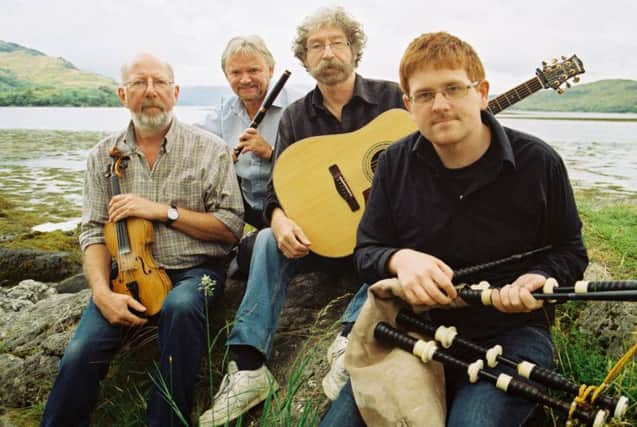The Tannahill Weavers ready for trip down memory lane


One of the first Scottish folk bands to add Highland pipes to their instrumental armoury, the Tannahill Weavers’ rumbustious combination of hard-driving instrumental sets and songs from their ebullient singer and guitarist Roy Gullane, has made them a hugely popular Scottish act on the international touring circuit since the 1970s. As well as gleaning various album awards during their career, the “Tannies” were inducted into the Scottish Traditional Music Hall of Fame in 2011.
Next Sunday’s concert at the National Piping Centre in Glasgow will see the band’s present line-up of long-standing singer-guitarist Gullane, piper Lorne MacDougall, fiddler John Martin and flautist Phil Smillie joined by several of their previous pipers.
Advertisement
Hide AdThe Tannies took the not inconsiderable step of adding the great Highland bagpipe to their line-up in 1976, but let’s first go back to their origins. “The band actually started in 1968, from sessions in Paisley,” Gullane recalls, speaking to me from his home in Groningen in the Netherlands, where he has lived since the mid-1980s. “It was a bunch of young guys who were very influenced by people like the Clancy Brothers and the Weavers.” Hence the name they adopted, combining that of the Paisley poet and songwriter, who died in 1810, and the popular American folk group.
Gullane, now 66, knew the initial members but had been singing with another outfit until he joined them in 1970. “The first time I went on stage with the Tannahill Weavers there were three of us – myself, John Cassidy and Stuart McKay, and then it was just a bit of a hoot, to be honest.
“We didn’t take anything particularly seriously, but we began to, and we added fiddle and bass guitar to the line-up.”
In 1976, after various personnel changes (including singer-songwriter Dougie MacLean playing fiddle with them for two years), they were rejoined by fiddler Mike Ward, who had previously left to play with Alba, alongside Tony Cuffe, Sean O’Rourke and, significantly, a fiery young piper called Alan MacLeod, whom he brought with him to the Tannahills.
The new line-up, with Ward and MacLeod joining Gullane, Smillie and multi-instrumentalist Hudson Swan, made an immediate impact, but not without some headaches involved in integrating the formidable sound of the Highland pipes into the group.
“It could be just a bit toe-curling in the beginning,” says Gullane. “They didn’t have the technology then and we had to work very hard at balancing the whole thing down. Also, with pipes being a semi-tone higher, you had to work out how to play with them. Me being a guitarist, for example, would I just tune up the semitone, use a capo or just get used to playing between the dots instead of on them?”
Advertisement
Hide AdEven before using pipes, the Tannies were developing the gruelling international touring pattern which they still follow (they’re in the United States this weekend). Gullane recalls an early gig at a festival in Tübingen, Germany, when they were still a twin-fiddle line-up. “It was in the courtyard of a castle, and they’d never heard Celtic music before. The place went nuts. The audience were kind of crowd surfing us, and the MC lost the plot because things weren’t going to plan.”
Over the years, the band would become renowned on both sides of the Atlantic as a formidable live act, with Garrison Keillor, the author and host of American Public Radio’s long-running Prairie Home Companion, commenting: “These guys are a bunch of heroes every time they go on tour in the States.”
Advertisement
Hide AdMacLeod left in 1985 and now lives in Vancouver. A distinguished roll-call of subsequent pipers includes the late Gordon Duncan, Iain MacInnes, Kenny Forsyth, Duncan Nicholson, Colin Melville and the present incumbent, Lorne MacDougall, and the Piping Live! concert is likely to include several of them.
“We haven’t finalised the [concert] plans yet,” says Gullane, “but it’ll be a bit of a trip down memory lane, joined by erstwhile band members. It should be very interesting – and a lot of fun.”
Piping Live! various venues, Glasgow, 10-16 August, www.pipinglive.co.uk